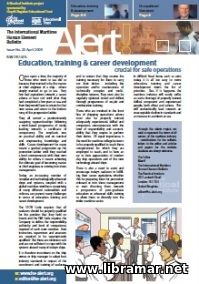 One more issue of Alert... This one is mainly dedicated to the education, training and development, as well as to the recognized occupational standards. In the past, most of the people going to the sea, did so because of their wish to become a captain of chief engineer of a vessel, while others just wanted to work at sea. Only few of those people had the aspirations towards building a career ashore.
Nowadays, there is a constantly increasing number of sophisticated and technically advanced vessels and systems which, when combined with the global labor force made up by so many nationalities, can definitely present serious challenges in the education of the seamen, their training and development of their careers. The STCW Code says that all seamen shall be duly qualified for the positions they work at on board, and the ISM Code obliges the Company to define the authority, responsibility and also the competence level required to be possessed by each of the crew members. In turn, all of the instructors and supervisors, and also assessors shall be "appropriately qualified".
However, these minimum sets are definitely not sufficient to cope with all systems on board many of the vessels today. That is why the ship owners and managers shall adopt the best shipping industry standards related to the recruitment and training of their employees... Best if supplemented with this short video.
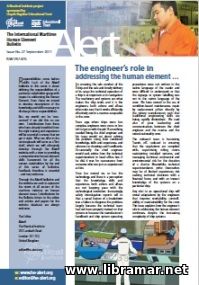 This issue of the Alert bulletin is fully devoted to the role engineers play in addressing such important aspect of work as the human element. To ensure the safe conduct of the vessel and that the cargo is delivered safely and timely, we shall pay equally close attention to the navigation and technical operation of the vessel. The shipboard machinery and hull systems make the vessel work and the engineers working both on board and ashore ensure that they operate in the efficient and effective may acceptable to the crew.
In the past the vessels were much less complex and, should something require fixing, the engineers on board managed to solve the problem locally, using their own knowledge and experience, and referring to the relevant handbooks and drawings. In case of necessity the technical superintendents stationed in the head office would be contacted for advice, but that was mainly done for reassurance. Nowadays, the technology is at the highest level and it eventually results in the skills, technical knowledge and experience of the engineers not being in pace with the latest technological advances.
As it come clear when analyzing numerous safety investigation reports, in many cases the reasons of the equipment breakdown was the failure of the engineers to properly diagnose the problem, mainly because of the poor training provided on particular system or due to the lack of available manufacturer's handbooks and manuals...
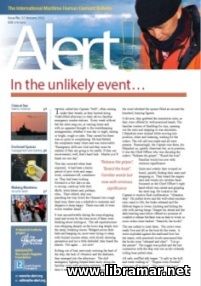 The thirty-seventh issue of Alert bulletin, this one is devoted to the survivability. Every single person engaged in the design, construction and operation of the vessels is automatically assigned a critical responsibility to ensure that no accidents will occur, and they are also considered responsible for the safety of the vessel and all people living and working on board.
It shall be noted that the term survivability does not only cover the lifesaving appliances, damage control, firefighting arrangements and shipboard security facilities. It is also important to have correct resources, adequate and effective training program and established procedures in place in order to ensure the ship safety and protection of the seafarers.
All seafarers shall be fully aware of the potential hazards associated with working on the vessel, particularly flood and fire risks, enclose space entry, up to the maritime terrorism and piracy. In addition, they should be aware of the different psychological effects of negative experience at sea and know where to seek support and advice.
Regularly conducted training and drills are extremely important - this is not only to satisfy relevant SOLAS requirements but also to make sure that the crew members know how to deal with all situations that may take place.
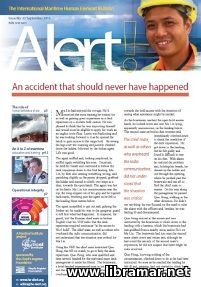 Another issue of the international bulletin exploring the behavior of human beings at sea. The booklet opens with the article of one accident that took place at sea but could actually have been avoided. In the sixth issue of the bulletin the Education has been termed as the gradual process of acquiring the professional knowledge through instruction and continuous learning as well as the development of the important personal attributes by unbringing and also gaining all required knowledge from the textbooks.
In everything people do there are training and education elements presented, especially when we address the role played by the human element in provision of safety of life at sea, recognition and development of the human resources and safety culture. The content of the present issue continues the topics explored within the issues nos. 6, 20 and 29 devoted to the competent people, education, training and career development, and maritime educators and instructors.
Have a look in this booklet of you have some interest in the human element and how it affects safety of people and vessels at sea. There is some information that will be of interest for the people from the industry.
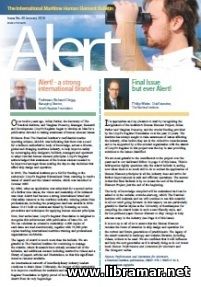 And here is the last, closing issue of the Alert Human Element Bulletin. That was a truly great project running nearly twelve years. The forty issues of the Alert bulletin all available here, comprise around 350 articles from the stakeholders across the shipping industry supplemented with twenty one instructional videos. It is really difficult to summarize the content of all forty issues in a single publication.
However, the authors have tried to make a sort of final message. First of all, note that the duly designed vessel and all systems on board shall meet all operator needs, they shall be easy to use and maintain and shall of course be reliable. The health taken together with the welfare and wellbeing of the crew members is a matter of utmost importance for the ship safety.
Another critically important aspect is the competency and professional experience of all people on board and their training. In addition, ship designers, seafarers and managers shall pay attention to the fatigue management. Moreover, another key item is effective communication providing safe and successful operation of any vessel. In short, just ear in mind that safe, satisfied, trained and motivated seafarers will eventually prove a best asset of any shipping company.
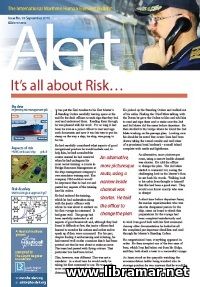 This penultimate issue of the human element bulletin is devoted to the risk management. In the twenty-sixth issue of Alert the focus was made on the fundamentals of the IMS, i.e. integrated management system. The serious demand for the effective processes and working systems related to the health and safety, quality and security as well as environmental awareness was underlines - they shall be combined with the established good working practices.
Numerous amendments have been made to the content of the ISM Code since then and one of them was introducing the changes in Section 6.2 of the Code requiring companies to ensure that each of their vessels is duly manned to maintain safe operations on board. In fact, manning issues can present quite serious risks therefore due attention should be paid to the safe manning principles.
Some guidance on proper interpretation of the safe manning principles has been provided within thirty-second issue of our bulletin. The ISPS Code, in turn, is covering the general aspects of shipboard security plus security in ports; however, the content of this Code does not address such newly introduced risk as cyber attack which should also be considered.
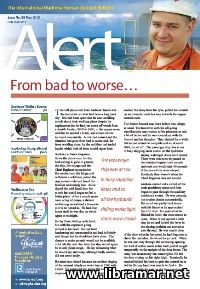 One of the last issues of Alert bulletin devoted to the human element and its importance for safe ship handling, safety of people on board and their wellbeing. This is one of the important aspects of the shipping industry and in the present volume we will focus on the health, wellbeing and welfare of the crew.
The impact of the MLC 2006 which is now supported by the relevant ILO Guidelines for Implementing S&H Provisions of MLC 2006 brought these subjects to the fore and emphasized the right of every crew member to a secure and safe working place complying with the established safety standards.
They also deserve fair employment terms and decent conditions of living and working, health protection and medical care as well as welfare measures and everything else required for social protection. Some of the aspects have already been addressed in the Issue 13 - Fatigue, Issue 17 - Accidents and Issue 17 - Health and Wellbeing.
The seafarers shall be not only physically but also mentally fit to cope with various demands of living and working on board such as loneliness and irregular contacts with family, language barriers, and many other things that can make it difficult and eventually affect their wellbeing since they are stressors...
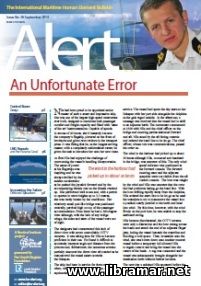 This issue of Alert bulletin is focusing on the operability, referred to as the controllability combined with the workability, maneuverability and accessibility. They often say that if you ask ten masters how they would prefer their navigation bridge laid out you will always get ten completely different answers. And, if you ask ten chief mates about the design of the cargo control room of their vessel you will likewise get ten different answer.
Same situation will be there if you ask ten chief engineers about the preferable machinery control room layout. And there is nothing surprising in this since, due to many reasons, each human has some own preferences for the design and arrangement of the control spaces since this would directly affect the way in which this person receives the information and processes it, reacts to various alerts and alarms, and manages all controls commonly associated with the numerous systems and instruments concerned with the safe navigation of the vessel.
Though it is obviously not possible to pander to all personal preferences, it is still necessary to determines what is required from the designers of the ship in terms of various user requirements as well as of the required functionality of shipboard systems.
|







